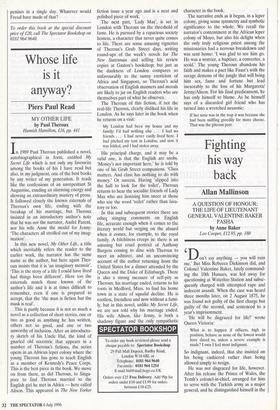Whose life is it anyway?
Piers Paul Read
MY OTHER LIFE by Paul Theroux Hamish Hamilton, £16, pp. 441
In 1989 Paul Therowc published a novel, autobiographical in form, entitled My Secret Life which is not only my favourite among the books of his I have read but also, in my judgment, one of the best books by any writer of my generation. It reads like the confessions of an unrepentant St Augustine, exuding an alarming energy and showing an extraordinary mastery of prose. It followed closely the known externals of Theroux's own life, ending with the breakup of his marriage, but Theroux insisted in an introductory author's note that he was not the narrator, Andre Parent, nor his wife Anne the model for Jenny: 'The characters all strolled out of my imag- ination'.
In this new novel, My Other Life, a title which inevitably refers the reader to the earlier work, the narrator has the same name as the author, but here again Ther- oux insists that it is 'an imaginary memoir'. 'This is the story of a life I could have lived had things been different'. Here too the externals match those known of the author's life and it is at times difficult to remember, even if one is prepared to accept, that the 'the man is fiction but the mask is real'.
This is partly because it is not so much a novel as a collection of short stories, one or two as good as anything he has written, others not so good, and one or two unworthy of inclusion. After an introducto- ry sketch of his Uncle Hal, the kind of gnarled old eccentric that appears in a number of Theroux's fictions, the series opens in an African leper colony where the young Theroux has gone to teach English as a member of Kennedy's Peace Corps. This is the best piece in the book. We move on from there, as did Theroux, to Singa- pore to find Theroux married to the English girl he met in Africa — here called Alison. This appeared in The New Yorker
fiction issue a year ago and is a neat and polished piece of work.
The next part, 'Lady Max', is set in London with Theroux on the threshold of fame. He is pursued by a rapacious society hostess, a character that never quite comes to life. There are some amusing vignettes of Theroux's Grub Street days, writing round-ups of the week's novels for The New Statesman and selling his review copies at Gaston's bookshop; but just as the dankness of London compares so unfavourably to the sunny exoticism of Africa and Singapore, so Theroux's acid observation of English manners and morals are likely to jar on English readers who are themselves part of what he observes.
The Theroux of this fiction, if not the real-life Theroux, clearly disliked his life in London. As he says later in the book when he returns on a visit: My London had been my house and my
family; I'd had nothing else . I had no friends ... I had never easily lived here. I had pitched my tent in London, and now it was folded, and I had stolen away.
His principal charge, and it may be a valid one, is that the English are snobs. 'Money's not important here,' he is told by one of his Grub Street companions. 'Class matters. And class has nothing to do with money.' Or success. Having 'slipped into the hall to look for the toilet', Theroux returns to hear the socialite friends of Lady Max who are lionising him sneer at those who use the word 'toilet' rather than lava- tory or loo.
In this and subsequent stories there are othet stinging comments on English life, accurate enough when it comes to the literary world but verging on the absurd when it comes, for example, to the royal family. A bitchiness creeps in: there is an amusing but cruel portrait of Anthony Burgess coming to dine with Theroux to meet an admirer, and an unconvincing account of the author returning from the United States for a dinner attended by the Queen and the Duke of Edinburgh. There is also a strong measure of self-pity as Theroux, his marriage ended, returns to his roots in Medford, Mass. to find his home town in a state of squalid decline. He is rootless, friendless and now without a fami- ly, but in this novel, unlike My Secret Life, we are not told why his marriage ended. His wife Alison, like Jenny, is both a hadowy figure and the only sympathetic
character in the book.
The narrative ends as it began, in a leper colony, giving some symmetry and symbolic significance to the whole. We recall the narrator's contentment at the African leper colony of Moyo, but also his delight when the only truly religious priest among the missionaries had a nervous breakdown and was sent home: 'I was glad to see him go. He was a worrier, a baptiser, a converter, a scold.' The young Theroux abandons his faith and makes a pact like Faust's with the savage demons of the jungle that will bring him sex, fame and fortune but lead inexorably to the loss of his Margareta/ Jenny/Alison. For his final predicament, he has only himself to blame. As he himself says of a discarded girl friend who has turned into a wretched neurotic: If her nose was in the trap it was because she had been sniffing greedily for more cheese. That was the piteous part.


























































 Previous page
Previous page